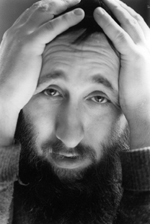By Rabbi Simcha Weinstein
Given the chance to choose my own “superhero” nickname, I’d have picked something more dynamic, like “Super Jew” or simply “The Rabbi.” (Imagine The Thing, but with a kippah.)
I come by my humble nickname honestly, though. My first book was called, Up Up and Oy Vey : How Jewish History, Culture and Values Shaped the Comic Book Superhero. Not surprisingly, I quickly came to be seen as an expert about the Jewish influence on American popular culture.
Most of the time, I study these matters at arm’s length — literally, with a well-thumbed issue of the Fantastic Four circa 1964 in hand.
However, I confess (and that’s not something rabbis normally do) that I sometimes fantasize about doing more than writing and talking about superheroes. Like millions of ordinary people, I wonder what it would be like to pull on some Spandex, then hit the mean streets and kick some villainous tuchas.
No wonder the new movie Kick-Ass is getting so much buzz. The film, based on the 2008 graphic novel by Mark Millar, tells the story of teenage dweeb Dave Lizewski, who sets out to become a real life superhero.
Like Stan Lee, Jack Kirby, Jerry Siegel & Joe Shuster and the other members of the tribe who created “Golden Age” superheroes like Superman, Lizewski is a bit of a nerd, invisible to girls and the “cool” kids. So he creates his own superhero costume, dubs himself “Kick-Ass” and goes out in search of bad guys to beat up.
Predictably, Dave fails at his first attempt to fight crime. He discovers that, unlike the fights he’s seen in the movies, real fisticuffs can actually be pretty painful.
After being recorded in action by bystanders with cell phones, Dave/Kick-Ass predictably becomes an internet phenomenon that inspires a whole legion of copycat costumed crime fighters, including a foul-mouthed 11-year-old named Hit Girl. Meanwhile, Dave sets up a Kick-Ass website and is soon overwhelmed by requests for help from total strangers.
These days, aren’t most of us looking for heroes, or wish we could be one? Before you dismiss Kick-Ass as ridiculous fiction, consider my friend, former yeshiva student turned crime-fighter Chaim Lazaros. A bit like Spiderman’s Peter Parker, Chaim is a student at Columbia University by day and a superhero by night, going by the name of “Life” (that’s what his given name means in Hebrew.) Dressed all in black – complete with an eye patch — Chaim goes out looking for trouble on the streets of New York, but it’s not what you think: he’s dedicated to helping out the sick and the homeless.
Chaim is one of a surprising number of people all over the world who are living out the Kick-Ass fantasy. At websites like RealLifeSuperheroes.org, they explain that their “main objective is to inspire others. We hope through our actions we can inspire others to go out and do good, help others, and stand up for what they believe in. There is a hero in everyone and we need to bring it out to help make this world a little more super.”
For whatever reason, these “real life superheroes” feel more empowered to help others when they put on a mask. It seems bizarre, but think about it: don’t we all wear a mask? We hide behind forced smiles or make-up or even Botox. Sometimes we “try on” a new personality, especially when we’re younger and just learning about ourselves, and the world. In fact, the word “personality” comes from “persona,” the Latin word meaning “mask.” We might have one “persona” at work, and another around friends, and yet another around members of the opposite sex we’re trying to impress. Sometimes we forsake our real selves for the assimilated archetype we think society wants us to portray.
So putting on the literal mask of the superhero lets Chaim and his partners in crime fighting throw off the shackles of society’s expectations and pursue more noble, transcendent pursuits.
Yet we have to remember that, “with great power comes great responsibility,” as Spider-Man always says, in a rueful, resigned tone that hints he’d rather be an ordinary mortal.
All of us have responsibilities, and they aren’t fantasies. We can’t hang them up in the closet like a cape when we’re too tired to deal with them. The secret is to stop thinking we either have to be a superhero or a nobody. Sometimes the bravest thing we can do is just be ourselves.
*
Simcha Weinstein is an internationally known, best-selling author. He chairs the Religious Affairs Committee at the renowned New York art school, Pratt Institute. His latest book Shtick Shift: Jewish Humor in the 21st century is out now.
